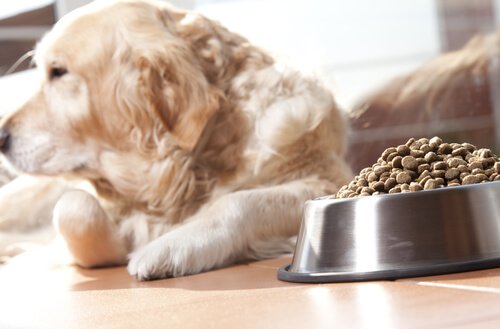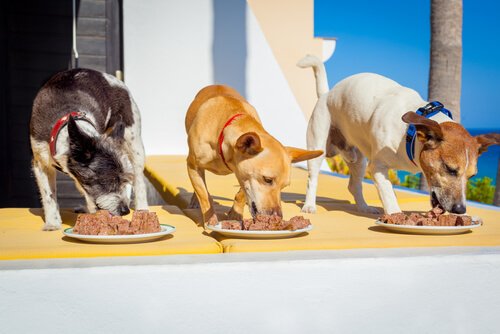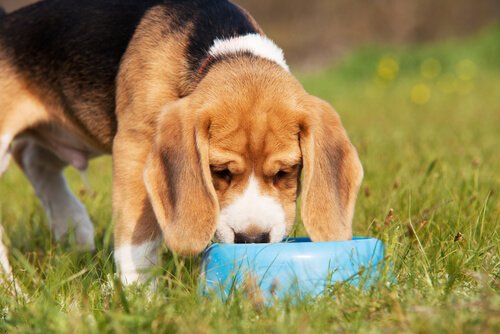How Much Should My Dog Eat?

If you’ve never had a pet, you could come up with a thousand questions about their diet and care. When it comes to their food, you could ask yourself things like, “how much should my dog eat?” “when should I feed them?” “what type of food should I pick out?” or “a metal dish or a plastic one?”
In My Animals, we’ll help you solve all your doubts about this topic. Let’s start with knowing what kind of food is good for your dog.
Choosing the right food
Knowing what kind of food is best for your dog isn’t as difficult as it might seem. Depending on the breed, age, and size, you’ll have to opt for one or the other.

- Small-sized dogs. Small breeds like the Chihuahua and Toy Terrier belong to this group. These dogs, due to their size, need a special diet that’s easy to chew in order to prevent tartar from building up, because these animals are more likely to have it. On the other hand, the diet must be rich in protein and vitamins, and low in fat to prevent obesity, which could cause serious diseases. At the same time, high fiber content favors good digestive function.
- Medium-sized dogs. This type of dog needs a lot of food that is easy to digest and provides them with a good amount of calories because they are very physically active. Make sure the food is a good source of vitamin C and E, and avoid excessive amounts of phosphorus.
- Large-sized dogs. Because of their large size, they need a diet that favors good bone strength and development. Just like a diet for medium dogs, it should also have a high caloric content.
- Puppies. You can never give a puppy, whatever its size, adult food. Think of them as if they were babies. All their body parts have begun to develop so they’ll need a special, suitable diet to help them develop correctly.
- Senior dogs. When dogs are older, they have special needs. They will need more tender, easy-to-chew food that strengthens their bones and immune systems.
In all cases, you should talk with a vet so he/she can tell you which food is best for your pet, according to their needs.
How much should my dog eat?
According to age and also size, there will be differences in the amount of food your dog needs.
For example, puppies need an average of about five meals a day. The amount they can eat is small. However, they use up a lot of calories because they have so much energy.
After six months, and until they are 1 year old, dogs will need three meals a day.
When they are adults, they won’t need more than two full meals per day, because they’re less active and no longer spend so much energy.
If your dog is a large-sized breed, you can choose to give him either two small portions during a day or one big one. They can become obese so you have to control their diet; otherwise they’re capable of eating everything.
According to experts and professionals, a dog should eat 2 to 3% of its body weight daily, so you can never go wrong with that.
When should my dog eat?

That’s going to depend on your schedule. Some people prefer that their dogs eat after them, so that their dogs know who’s in charge. The “leader of the pack” eats first, and then your dog (this is the most recommended way to feed a dog). However, some people prefer to let their dogs eat before them, so that they don’t disturb the owners while they eat their meal.
Whatever you choose, you must keep this in mind: dogs learn routines, so it’s important to feed them according to a schedule. Always feed your pet at the same time, and the same place too.
Finally, as to the question about whether the dish should be plastic or metal, we recommend it to be metal, based on the opinions of veterinarians. Plastic bowls crack easily, even invisibly, so it accumulates a myriad of bacteria that can harm your pet’s health.
In contrast, metal is so much more hygienic and germ-free when you wash it. Anyways, in regard to your question about “how much should my dog eat?” now you know the answer!